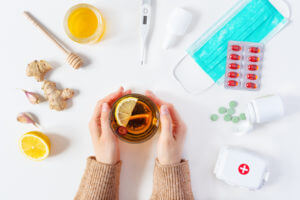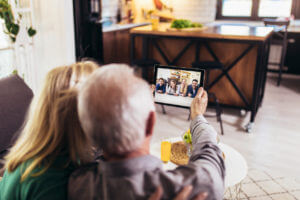The Functional Medicine Approach to Minimizing COVID-19 Spread Over the Holidays
Here’s what functional medicine can tell you about the holiday season: Pandemic bubbles are a good idea, having a solid immune health routine is crucial, and different types of holiday gatherings are more risky than others. So what does all this mean for your holiday festivities?
Meaningful celebrations during this year’s holiday season promise to look very different than any before, as pandemic-weary friends and family prepare for potential travel, and creative and safe ways to enjoy time together. Here’s what you should remember when seeking out holiday merriment amid a pandemic…
Going Home for the Holidays
In many ways, mitigating the spread of COVID-19 will be more difficult than it was in the early summer. Cooler temperatures and more time spent indoors means closer quarters and a higher risk of airborne germs of all kinds–plus one group of adolescents known for their high rate of transmission is headed home to their families from all over the country.
According to the CDC, the U.S. officially surpassed the benchmark of 100,000 new cases of the virus per day on Nov. 4th, and this number is projected to continue to climb throughout the winter (1).
Considering even routine holiday travel already comes with its fair share of do’s and don’ts, the pandemic will likely affect your plans in some way, whether it’s strict statewide restrictions in states like New York, or a 2-week quarantine in localities like Chicago.
How Is the Travel Industry Making Things Safer?
Fortunately, most large airplanes already use HEPA filtration systems to maintain healthy air quality in the cabin, resulting in lower risk of transmission than other areas of confined occupancy, such as buses or cars (2). These filters are effective at trapping particles as small as viruses or bacteria.
The International Air Travel Association is also calling for the availability of COVID testing pre-flight to reassure travelers that flying is safe, and to avoid quarantine measures in travelers’ destinations, though this hasn’t yet come to fruition.
When flying, be especially vigilant both inside and outside of the flight itself. Airports are bustling hubs with hurried travellers who may forget their pandemic protocol. Keep your hands away from your eyes and face, your mask comfortably over your mouth and nose, and bring hand sanitizer to use when needed.
Prior to traveling, IV therapy is a great way to deliver immune supportive nutrients directly to cells. The Cold & Flu Buster drip is a perfect option post-travel as well.
Hotels
When it comes to lodging, hotels or vacation rentals are considered a safer option than staying at a friend’s or relative’s. Hotel occupancy across the country is less than half normal level, so you may even expect contact with fewer strangers (3).
Flying vs. Driving
Concerning modes of travel, driving is safer than flying, as there’s less interaction with people, and those traveling together generally come from the same household. When traveling, we like to pack at least one option for added immune support, alongside staples like vitamin D. The Defender is comprehensive immune support, along with Viracid capsules.
The CDC also recommends pumping gas with a sanitary wipe, and bringing travel snacks from home to minimize time spent in indoor areas while traveling to your destination.
Staying safe and healthy while traveling is everyone’s top priority, but the situation gets more complicated when college kids enter the equation.
Can Colleges Minimize Spread of COVID-19?
College kids are bringing more than just their laundry home for the holidays, already contributing to increased spread due to travel to and from campus.
There are three main issues with college students and their return to their hometowns.
- Evidence suggests they have a higher rate of asymptomatic spread, which means they’re less likely to be mindful of safety measures, believing they’re not carriers (4).
- Some campuses have an established protocol for testing and containing COVID cases, but many do not.
- College students live, work, and study in close quarters while at school, and quarantining prior to holiday travel is unlikely, if near impossible.
For these, and other reasons, the American College Health Association recommends students attending in-person instruction should avoid travel over Thanksgiving (5).
If you do have a student coming home for the winter break, consider employing some of the following measures to maximize safety, and minimize COVID risk.
Preserving Your Pandemic Bubble for the Holidays
Maintaining a pandemic bubble is a great way to minimize exposure and spend your time with a small group of friends or family. Your pandemic bubble may consist of only your family, or though structured planning, may include a small group of friends who socialize within their group, but seldom with those outside it.
Testing is one way families or friends can merge their pandemic bubbles with others, although this requires planning, and each member adhering to some level of quarantine before and after testing negative.
If merging your bubble with others, it’s a good idea to do so at a neutral location, such as a vacation rental. Most of these services offer an enhanced cleaning between visitors, and this will support your newly joined bubble with other friends or family, if you so choose.
Boost Winter Immune Health
Many families and individuals have already adopted a few immune supportive behaviors, but it’s time to adapt your immune routine to winter changes. For winter immune health, consider:
- Increasing vitamin D supplementation – One study found that 80% of patients with
 COVID-19 had vitamin D deficiency (6). As sunlight exposure decreases, increase foods like fish, grass-fed red meat, eggs, or continue with a vitamin D3 supplement.
COVID-19 had vitamin D deficiency (6). As sunlight exposure decreases, increase foods like fish, grass-fed red meat, eggs, or continue with a vitamin D3 supplement. - Getting quality sleep – Sleep and immune health are inextricably linked, and as stress continues to climb throughout the holiday season, it’s important to prioritize adequate rest.
- Lowering inflammation – Decreasing inflammatory foods such as refined grains and sugar in favor of more nutrient-dense whole foods supports healthy immune function and better cellular health.
- Avoiding alcohol – Alcohol is a known endocrine and immune disruptor, and can also lower inhibitions which make you more likely to disregard social distancing and good hygiene.
You can prepare your immune system this winter with a few simple changes that will help both yourself and those around you.
Hosting a Gathering at Home
Many families are still choosing to host gatherings at home, opting for time spent with loved ones that’s been sorely missed. If you’re planning a holiday festivities at your house soon, consider the following to minimize risk:
- Keep attendance small.
- Consider dining outdoors, weather permitting.
- Avoid sharing bathrooms with those not in your pandemic bubble.
- Stock paper towels near the sink to avoid a shared towel.
- Forego hugs, kisses, and handshakes.
- Wear a mask except when eating.
- Stay distanced from those not in your household.
Enjoying the Holidays Apart
Many people have several family members who fall into the “high-risk” category for COVID, or prefer to postpone gatherings until restrictions are lifted. But that doesn’t mean everyone has to miss out on connection. In fact, taking advantage of technology paired with a little creativity can go a long way this holiday season.
has to miss out on connection. In fact, taking advantage of technology paired with a little creativity can go a long way this holiday season.
Organize a holiday video call and pull out all the stops. Change into your fancy clothes (okay, just out of your sweatpants would be nice!) and decorate your space.
Stick with tradition. Does your family begin holiday meals by sharing what you’re thankful for? Do that, even on a video call. Going through these activities, no matter how trivial, strengthens connections and brings us solidarity and validation.
(Don’t have any traditions? Now is a great time to start one. Share your gratitude, make a new recipe, and don’t be afraid to think outside the box.)
Set the laptop or phone on the table (or appropriate space) in front of you so it looks more like you’re all sitting around the table during your holiday meal.
Integrative & Functional Medicine for the Holidays
Though this winter season promises to look different than any other in our recent past, we’re confident that with a little planning and creativity, we can still safely enjoy the traditions and merriment we’ve all been lacking.
Prioritizing immune health, and being mindful about the spread of potential germs during travel and celebrations is the best way to keep family members and friends healthy and safe throughout the holiday season.
Resources
- https://covidtracking.com/
- https://www.iata.org/contentassets/f1163430bba94512a583eb6d6b24aa56/cabin-air-quality.pdf
- https://www.ahla.com/covid-19s-impact-hotel-industry
- https://arxiv.org/abs/2006.08471
- https://www.acha.org/documents/Resources/COVID_19/ACHA_Brief_Considerations_for_IHEs_as_Students_Return_Home_10.29.2020.pdf
- https://www.endocrine.org/news-and-advocacy/news-room/2020/study-finds-over-80-percent-of-covid19-patients-have-vitamin-d-deficiency

